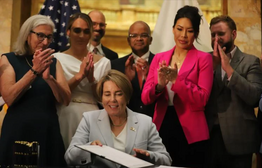Healey housing approach taking shape
 PHOTO | Courtesy of State House News Service
Housing Secretary Ed Augustus pictured at a Sept. 12, 2023 Local Government Advisory Commission meeting.
PHOTO | Courtesy of State House News Service
Housing Secretary Ed Augustus pictured at a Sept. 12, 2023 Local Government Advisory Commission meeting.
While the wait continues for a housing bond bill, the Healey administration's housing production vision is slowly coming into view, and it will feature more than 20 policy changes designed to drive up the state's lowest-in-the-nation vacancy rate, according to the state's housing secretary.
Housing and Livable Communities Secretary Ed Augustus walked members of the business community through the administration's latest thinking during remarks at an Associated Industries of Massachusetts event Thursday at Putnam Investments in Boston.
The Healey administration's point person on housing issues plans to use "more of a scalpel than a meat cleaver" in housing policy, with an eye towards filling voids in inventory facing low-income residents, first-time homebuyers, and older residents looking for new housing options.
He described a 200,000-unit housing gap in Massachusetts that must be closed to keep up with population growth and stem the loss of talented workers.
"Our housing ecosystem in Massachusetts is literally upside down," Augustus said, using colorful language to outline a landscape where would-be first-time homebuyers face competition from people making cash offers, waiving home inspections, or offering sellers more money than homes are listed for.
"If you're a first-time homebuyer and a couple of years into your career, you're getting ready to start your family and you're trying to get that kind of foothold on the American dream and all that comes with homeownership. Increasingly for folks, they're finding that that's just an impossible aspiration," Augustus said, according to audio of his remarks shared with the News Service.
People who need to devote 40 to 50 percent of their income to housing will consider leaving the state, Augustus said, and that's an "existential threat" to Massachusetts' competitiveness.
The 20 policy changes, as Augustus described them, will likely be attached to Healey's multi-year housing bond bill, which is expected to emerge in the coming days. Legislators will be looking to advance the bill to recapitalize housing programs, and the administration wants its policies to ride with it.
"We want to take a look at the bond bill and say, 'look, this is a vehicle that needs to pass, this is something that's moving, can we take full advantage of this vehicle and do more to meet the moment?'" Augustus said. "So we are going to be filing a bond bill in a week or two that is going to have an awful lot of policy recommendations as well as some historic investments in the bond authorizations that we're going to ask the Legislature for. We think that's what the moment demands."
In mid-September, Augustus said he expected the big housing bill to be rolled out by the end of September or early October. He also talked about proposing a "seasonal communities designation" plan designed to make more housing available for workers in places like the Berkshires or the Cape and Islands.
Augustus on Thursday again mentioned a seasonal designation plan, saying something must be done to address a housing squeeze that is worsening in tourist destinations because more homes that used to be rentals for workers are now short-term rentals for vacationers.
In some places on Cape Cod, Augustus said, officials are reporting that half of the workforce is driving over the Cape bridges to get to work, a trend with emissions impacts and one that he said he "can't imagine" once work begins to replace the bridges.
The secretary didn't attach any specifics to the seasonal communities designation or mention real estate transfer taxes, which are favored by some Cape and Islands residents as a way to generate revenue to help address the workforce housing crunch.
Augustus said a law approved before Gov. Maura Healey took office changed the regulatory environment around housing by cutting through zoning hurdles and requiring more multi-family housing near MBTA stations in 177 communities.
That law was complemented, he said, by last week's signing of a tax reform law that will drive $57 million worth of tax credits into a market rate housing production program in cities. In addition to the one-time credits, the annual cap on the Housing Development Incentive Program is rising from $10 million to $30 million, a change that Augustus said represents a "powerful accelerant" for market rate housing production.
Another housing credit that the secretary said drives production of workforce housing is also on the rise under the tax law, with the Low-Income Housing Tax Credit climbing to $60 million per year, up from $40 million.
An influx of migrants who have left their home countries and are trying to settle in Massachusetts has added another layer of complexity to the situation. Last week there were 6,800 families in emergency shelters, by far largest number in the history of the state's right-to-shelter law, Augustus said.
"It is an important responsibility that we have," he said. "It's the kind of state that we want to be, that we don't allow pregnant moms and children to be left unsheltered. But that responsibility is very heavy when you're talking about the volume of folks that are coming through that safety net system."
The situation "gets more challenging," he said, because families can't move quickly through the shelter system and into permanent housing when there is a 1.6 percent vacancy rate, the lowest of the 50 states. In a "healthy ecosystem," that rate should be in the 4 to 5 percent range.













0 Comments